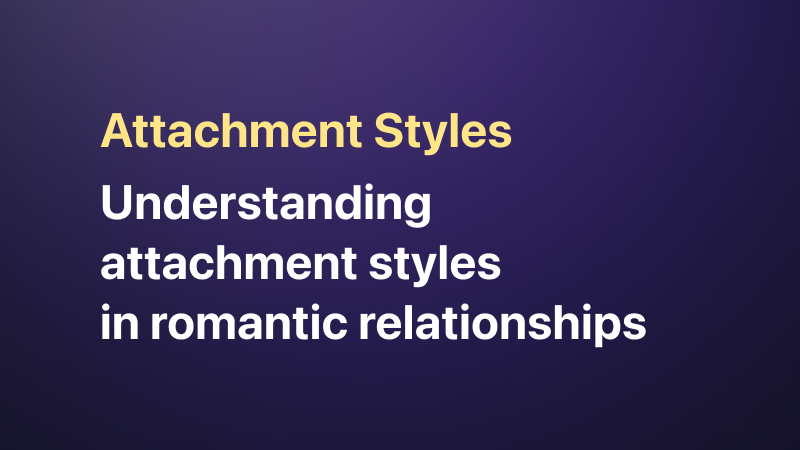Ever wonder why you and your partner react differently to the same situation? One minute you’re cruising through life, and the next, you’re in a confusing swirl of emotions and misunderstandings. It’s like a weird dance—sometimes you’re in sync, sometimes you’re stepping on each other’s toes. What if I told you this isn’t just random? There’s a reason behind it, and it all comes down to something called attachment styles.
Attachment styles are basically the “operating system” of your love life. They’re how you connect, show affection, and respond to closeness or conflict. The better you understand them, the easier it gets to groove together instead of fumbling apart.
Let’s dive in and see how these styles shape our relationships—and how you can use this knowledge to level up your connection.
The Big Four Attachment Styles
1. The Cozy Snuggler (Secure Attachment)
This is the “I’m good, you’re good” vibe. Cozy Snugglers feel safe and connected in relationships. They’re the type who don’t freak out when their partner needs space, and they’re down to talk things through when stuff gets real. Think of them as the emotional glue that holds everything together without too much fuss.
How they roll: These folks are pretty chill about love. They know how to balance independence and intimacy like a pro and aren’t easily thrown off by emotional hiccups. They make you feel seen, heard, and safe.
2. The Space Cadet (Avoidant Attachment)
Ever been with someone who’s all about “me time”? That’s the Space Cadet. They value independence and might feel a little claustrophobic when things get too close for comfort. Their mantra? “Don’t fence me in.”
How they roll: Space Cadets are great at handling themselves but might struggle to open up or show their softer side. They’re not anti-relationship—they just need a little extra breathing room. If they seem distant, it’s not you, it’s just their style.
3. The Clingy Cuddler (Anxious Attachment)
Clingy Cuddlers are the emotional rockstars who crave connection and affection. They wear their hearts on their sleeves and are all about that loving reassurance. The flip side? They can get a bit uneasy when things feel off or uncertain, often needing more validation to feel secure.
How they roll: These folks are passionate, expressive, and wear their love loud and proud. But they can also get stuck in the “what ifs,” overthinking their partner’s every move. A little extra love goes a long way here.
4. The Hot ‘n’ Cold (Fearful-Avoidant Attachment)
This style is like a mixtape of Space Cadet and Clingy Cuddler. Hot ‘n’ Colds crave closeness but are also scared of getting hurt, so they keep you at arm’s length. They want to be loved but are wary of getting too close.
How they roll: Expect a little back and forth—they’re the type to pull you in and push you away. They want you, but the fear of getting burned keeps them on edge. Understanding, patience, and consistency are key here.
Why Knowing Your Style Matters
Understanding your attachment style is like having a cheat code to your relationship. It helps you spot the patterns, understand your reactions, and figure out why your partner does that weird thing they do when you argue. It’s not about slapping on a label and calling it a day—it’s about knowing where you stand and where you can grow together.
How to Use Attachment Styles for Better Connection
-
Get Curious: Instead of assuming your partner is doing something just to annoy you, get curious about what might be driving their behavior. Maybe they’re not being distant to hurt you—they’re just wired that way.
-
Keep It Playful: Don’t make this a blame game. Use it as a fun way to understand each other better. It’s not about changing who you are but about tweaking your dance moves together.
-
Communicate (Without the Psychobabble): You don’t need to have deep, therapy-style conversations. Just share what you’re noticing in a light, open way. The goal is to connect, not critique.
-
Give Each Other Some Grace: No one’s perfect, and that’s cool. We’re all just figuring this stuff out. If you mess up, don’t sweat it. Just come back to the conversation with kindness.
Self-Reflection Question
What is one behavior in your relationship that triggers you, and how might your attachment style be influencing your reaction?
Quick Quiz: What’s Your Attachment Style?
-
When you’re upset with your partner, you…
- A. Talk it out calmly and work through it.
- B. Withdraw and need some space.
- C. Get anxious and need reassurance.
- D. Feel conflicted—wanting closeness but also wanting to push them away.
-
Your ideal date is…
- A. A cozy night in, enjoying each other’s company.
- B. An adventure that gives you both space to explore.
- C. Anything that feels romantic and connected.
- D. Something fun but low-pressure—intimacy is great, but not too intense.
-
When you think about your relationship, you feel…
- A. Secure and happy.
- B. Independent and sometimes distant.
- C. Passionate but occasionally anxious.
- D. Torn between wanting more and fearing it.
Understanding attachment styles is like discovering a hidden map of your relationship. It doesn’t solve everything, but it helps you see the bigger picture and gives you the tools to build deeper, more joyful connections. So, grab your partner, start the conversation, and see where it takes you!




